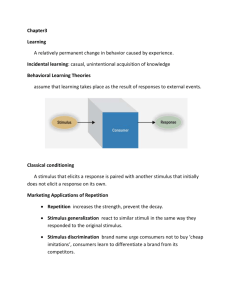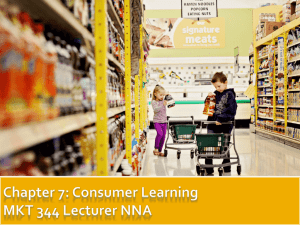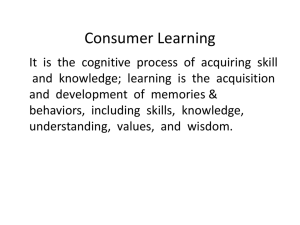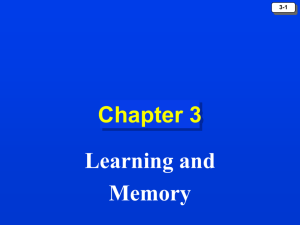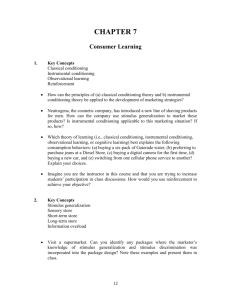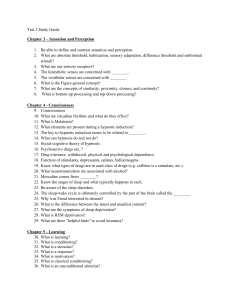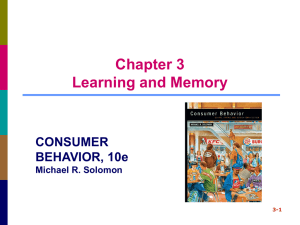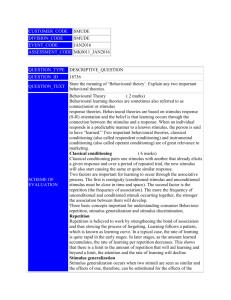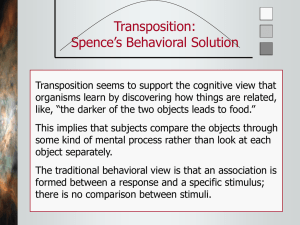mkt348ch7 - Brand Luxury Index
advertisement
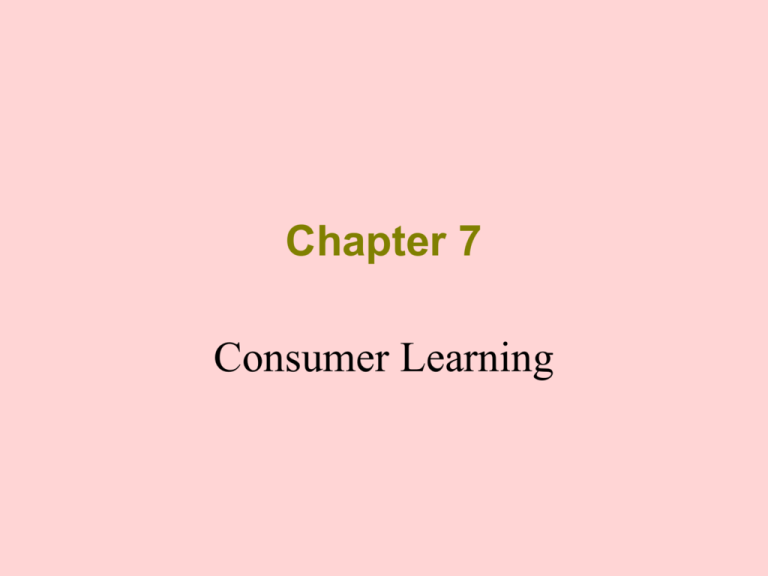
Chapter 7 Consumer Learning Cognitive Learning Theory A theory of learning based on mental information processing, often in response to problem solving. Consumer Learning A process by which individuals acquire the purchase and consumption knowledge and experience that they apply to future related behavior. Behavioral Learning Theories Theories based on the premise that learning takes place as the result of observable responses to external stimuli. Also known as stimulus response theory. Elements of Learning Theories • • • • Motivation Cues Response Reinforcement Behavioral Learning Theories • Classical Conditioning • Instrumental Conditioning • Modeling or Observational Learning Classical Conditioning A behavioral learning theory according to which a stimulus is paired with another stimulus that elicits a known response that serves to produce the same response when used alone. Instrumental (Operant) Conditioning A behavioral theory of learning based on a trial-anderror process, with habits forced as the result of positive experiences (reinforcement) resulting from certain responses or behaviors. Basic Concepts of Classical Conditioning • Repetition • Stimulus Generalization • Stimulus Discrimination Stimulus Generalization The inability to perceive differences between slightly dissimilar stimuli. Stimulus Generalization and Marketing • • • • Product Line, Form and Category Extensions Family Branding Licensing Generalizing Usage Situations Stimulus Discrimination The ability to select a specific stimulus from among similar stimuli because of perceived differences. Stimulus Discrimination and Marketing • Positioning • Differentiation Instrumental Conditioning and Marketing • Customer Satisfaction (Reinforcement) • Reinforcement Schedules – Shaping • Massed versus Distributed Learning Observational Learning A process by which individuals observe the behavior of others, remember it, and imitate it. Also known as modeling. Cognitive Learning Theory Holds that the kind of learning most characteristic of human beings is problem solving, which enables individuals to gain some control over their environment. Information Processing A cognitive theory of human learning patterned after computer information processing that focuses on how information is stored in human memory and how it is retrieved. Issues In Information Processing • How Consumers Store, Retain and Retrieve Information • Limited and Extensive Information Processing Limited and Extensive Information Processing • Extensive and complex processing of information may not apply to all purchase decisions • Involvement may influence extent of information processing Involvement Theory A theory of consumer learning which postulates that consumers engage in a range of information processing activity from extensive to limited problem solving, depending on the relevance of the purchase. Issues in Involvement Theory • • • • Involvement Theory and Media Strategy Involvement Theory and Consumer Relevance Central and Peripheral Routes to Persuasion Measures of Involvement The Elaboration Likelihood Model Involvement HIGH LOW Central Route Peripheral Route Message Arguments Influence Attitudes Peripheral Cues Influence Attitudes Measures of Consumers Learning • Recognition and Recall Measures – Aided and Unaided Recall • Cognitive Responses to Advertising – Copytesting • Attitudinal and Behavioral Measures of Brand Loyalty Brand Equity The value inherent in a wellknown brand name. Brand Loyalty Consistent preference and/or purchase of the same brand in a specific product or service category.
